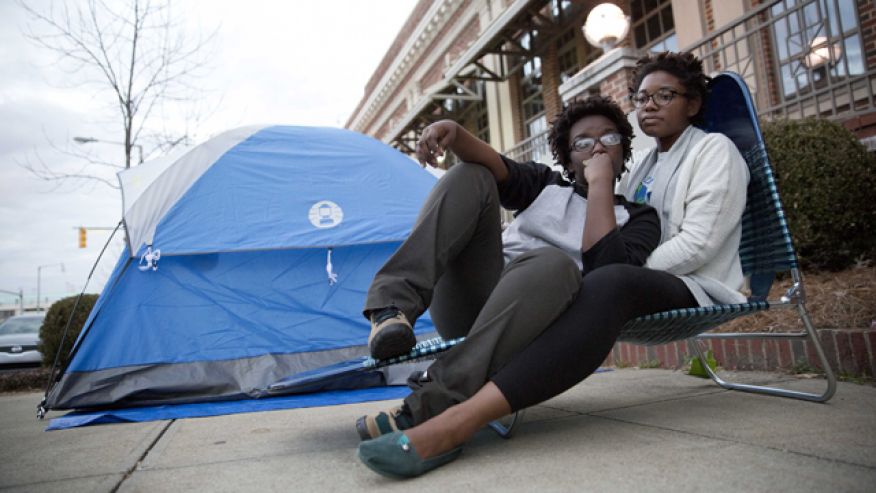>> Alabama gay marriages allowed after Supreme Court order
La Cour suprême des Etats-Unis a refusé lundi d’arrêter les mariages des couples de même sexe en Alabama. Une décision contraire au souhait des autorités de l’Etat qui voulaient les geler jusqu’à une décision à portée nationale de la haute Cour en juin.
Dans une brève décision distribuée aux journalistes, sept juges sur neuf ont débouté l’Alabama de son ultime recours, autorisant de facto les couples homosexuels à se marier. Il s’agira du 37e Etat américain sur 50 où le mariage gay devient légal (ainsi qu’à Washington), si les juges des affaires familiales de l’Alabama, chargés des mariages, ne font pas de la résistance.
Le ministre de la Justice de l’Alabama, Luther Strange, regrettant la décision de la Cour suprême, a en effet rappelé lundi qu’il n’était pas chargé de la publication des bans, responsabilité des juges aux affaires familiales. Or le président de la plus haute Cour de l’Alabama, Roy Moore, a expliqué dimanche à ces juges qu’ils n’étaient pas tenus d’appliquer les décisions fédérales et qu’ils ne devaient pas établir de certificats de mariage aux couples de même sexe, en attendant que la Cour suprême statue fin juin.
Partout aux Etats-Unis?
Entre le 20 et le 29 avril, la Cour suprême se demandera si les couples homosexuels peuvent se marier partout aaux Etats-Unis, où la loi du mariage est du ressort d’un Etat. L’Alabama avait interdit les mariages homosexuels, mais un tribunal fédéral avait invalidé cette interdiction, la jugeant contraire au 14e Amendement de la Constitution, qui garantit l’égale protection de tous.
Après plusieurs décisions contradictoires à travers le pays, la Cour suprême a décidé de trancher au niveau national. Elle se penchera sur les recours de l’Ohio, Michigan, Tennessee et Kentucky, qui interdisent le mariage gay et où il a été suspendu entre-temps.
Sur la photo, Shanté Wolfe, à gauche et sa compagne, Tori Sisson, à droite qui ont campé tout le week-end devant le Palais de justice du comté de Montgomery en Alabama pour devenir le premier couple à se marier 🙂
>> Gay marriage is moving forward in the heart of the South on Monday after the Supreme Court denied a request from Alabama for a delay.
The Supreme Court’s move makes Alabama the 37th state to allow gay marriage. It comes ahead of a decision expected later this year that could expand marriage rights to gay couples across the country.
« It’s a great day in Alabama for everyone who cherishes freedom, » said Richard Cohen, President of the Southern Poverty Law Center.
A district court judge struck down Alabama’s gay marriage ban in January. The state hoped to block that ruling until the Supreme Court decides the larger marriage case.
In denying Alabama’s request for a delay, the Supreme Court set up a clash with state judicial officials. Roy Moore, the controversial Chief Justice of the Alabama Supreme Court, warned probate judges in the state not to issue marriage licenses.
In the order, Moore said « effective immediately, no probate Judge of the State of Alabama » should issue or recognize a marriage license that is inconsistent with a State constitution. In the order, Moore says that the opinions of the United States District Court for the Southern District of Alabama do « not bind the state courts of Alabama but only serve as persuasive authority. »
In 2003, Moore was removed from the court by a state ethics panel after he refused to remove a monument to the Ten Commandments in the court building. Moore was re-elected in 2012. It was unclear if the probate judges will find themselves caught in the middle.
Cohen’s group has brought an ethics challenge against Moore for issuing the order. In the statement today Cohen said, « We congratulate the same-sex couples who are finally able to marry in our state, and we honor the probate judges who are following the Constitution of the United States rather than Chief Justice Moore’s suggestion they defy it. »
Stephen I. Vladeck , a Professor of Law at the American University Washington College of Law and a CNN analylst said that while Chief Justice Moore is correct that the state probate judges aren’t bound by the district court’s ruling, « he’s wrong, —incomprehensibly so—to suggest that those same judges can follow the Alabama Constitution over and above what those judges believe federal law mandates. »
Ronald Krotoszyniski, a professor at the University of Alabama School of Law, said that if a probate judge were to refuse to grant a license, the couple seeking to marry could go to federal court to seek enforcement of the district court order. « I think the federal court would respond favorably to the request and issue an injunction requiring the probate judge to respect the district court order. My guess, is that the probate judge would be subject to fines, » he said.
Justice Clarence Thomas, joined by Justice Antonin Scalia, wrote a rare dissent from denial saying they would have granted the request for a stay.
« In this case, the Court refuses even to grant a temporary stay when it will resolve the issue at hand in several months, » Thomas said. « I would have shown the people of Alabama the respect they deserve and preserved the status quo while the Court resolves this important Constitutional question. »
Thomas said the court’s acquiescence « may well be seen as a signal of the Court’s intended resolution » of the pending question.
Shortly after the news came out, local media began tweeting scenes from court houses around the state.


















